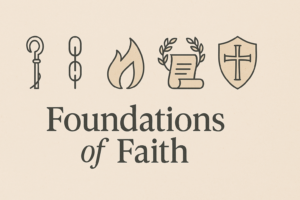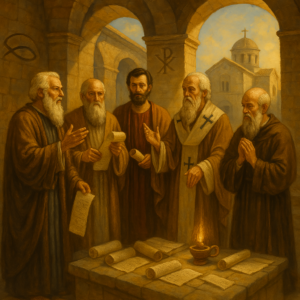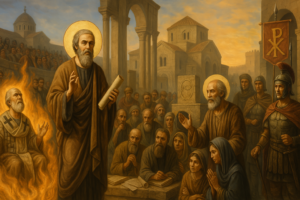Estimated reading time: 15 minutes
Key Takeaways
- The early church fathers played a crucial role in preserving Christian doctrine during times of persecution and heresy.
- Their writings serve as a vital link between the apostles and the medieval church, providing foundational theological insights.
- The Nicene Creed remains a unifying statement of faith across various Christian denominations.
- Understanding the historical context of these leaders enriches modern faith and practice.
- Resources like early church fathers online make their writings accessible to contemporary readers.
Early Church Fathers: Foundations of Christian Doctrine
The early church fathers were the first Christian theologians and leaders who lived after the apostolic age (roughly 100-800 AD). These devoted men preserved, defended, and developed Christian doctrine during a time when the faith faced persecution from outside and heresy from within.
Their writings serve as a vital link between the apostles and the medieval church. They took the teachings of Jesus and the apostles and applied them to new situations and challenges. Through their wisdom, courage, and devotion, they established the theological foundations that Christians of all denominations still rely on today.
Many of their writings are available through early church fathers online resources, making their ancient wisdom accessible to modern believers seeking to deepen their faith.
The Nicene Creed’s significance cannot be overstated. This statement of faith, developed at the Council of Nicaea in 325 AD and expanded at the Council of Constantinople in 381 AD, remains the only ecumenical creed accepted by Roman Catholic, Eastern Orthodox, and many Protestant churches. It represents the core beliefs that unite Christians across time and denominations.
The creed came about as church leaders responded to controversies about Jesus’ divinity. It provides clear, authoritative statements about the Trinity, Christ’s nature, and other essential Christian doctrines that continue to guide believers today.
Historical Context of the Early Church Fathers
The early church fathers’ history spans several crucial centuries of Christian development. Scholars typically categorize them into three groups:
- Apostolic Fathers: Those who lived closest to the apostolic age (c. 100-150 AD), including Clement of Rome, Ignatius of Antioch, and Polycarp of Smyrna.
- Ante-Nicene Fathers: Those who lived before the Council of Nicaea (c. 150-325 AD), including Justin Martyr, Irenaeus, Tertullian, and Origen.
- Post-Nicene Fathers: Those who lived after the Council of Nicaea (c. 325-800 AD), including Athanasius, the Cappadocian Fathers, John Chrysostom, and Augustine.
The apostolic fathers hold special importance as the bridge between the apostles and later church leaders. These men likely had personal connections to the apostles or their immediate disciples. Their primary concern was preserving the gospel message exactly as the apostles had proclaimed it.
The apostolic church fathers faced tremendous challenges. The church was young, scattered, and increasingly persecuted. False teachings threatened to distort the gospel. Through their writings and leadership, these early fathers established patterns of worship, church organization, and doctrinal understanding that would guide Christianity for centuries.
Among the most influential early church leaders were:
- St. Justin Martyr: A philosopher who converted to Christianity and became one of its first major apologists.
- Irenaeus: Bishop of Lyon who fought against Gnosticism and helped establish the importance of apostolic succession.
- Tertullian: North African theologian known for his passionate defense of Christianity and development of Trinitarian language.
- Origen: Brilliant but controversial Alexandrian scholar who produced extensive biblical commentaries.
- Polycarp of Smyrna: Disciple of the apostle John who passed on apostolic teaching and died as a martyr.
- Ignatius of Antioch: Bishop who wrote seven letters on his way to martyrdom in Rome, emphasizing church unity and structure.
These pioneers of faith recognized that Christianity would face ongoing challenges that required thoughtful responses based on scripture and apostolic teaching.
Learn more about their historical context on Wikipedia.
Key Writings and Contributions
The apostolic fathers’ writings form the earliest body of Christian literature outside the New Testament. These texts reveal how the first generations of Christians understood and applied apostolic teaching. Major works include:
- The First Epistle of Clement: Written around 95 AD from the church in Rome to the church in Corinth, addressing leadership disputes.
- The Letters of Ignatius: Seven letters written by Ignatius while being transported to Rome for execution.
- The Didache: An early church manual covering ethics, rituals, and church practices.
- The Epistle of Barnabas: A theological treatise on the relationship between Christianity and Judaism.
- The Shepherd of Hermas: A lengthy work containing visions and moral teachings.
St. Justin Martyr’s writings stand out for their philosophical approach to defending Christianity. As a former pagan philosopher, Justin used Greek concepts to explain Christian beliefs to a Roman audience. His “First Apology” and “Second Apology” addressed common accusations against Christians and provided some of our earliest descriptions of Christian worship, including baptism and the Eucharist.
Justin Martyr also engaged in debates with Jewish scholars and wrote “Dialogue with Trypho”, which outlined Christian interpretations of Old Testament prophecies about Jesus. His willingness to engage with non-Christian thought while maintaining doctrinal integrity made him a model for later Christian apologists.
Irenaeus’ fight against heresies was particularly influential. His five-volume work “Against Heresies” thoroughly explained and refuted Gnosticism, which threatened to undermine authentic Christianity. Irenaeus emphasized several key points:
- The unity of God as creator and redeemer
- The reality of Christ’s incarnation and physical resurrection
- The importance of apostolic succession
- The authority of the four canonical Gospels
Ignatius of Antioch’s writings consist of seven letters written while he traveled to Rome for martyrdom (around 107-110 AD). These letters reveal his understanding of church structure, with bishops, presbyters, and deacons. He emphasized church unity, proper respect for church leaders, and the real humanity and divinity of Christ.
Polycarp of Smyrna’s writings include his “Epistle to the Philippians”, which quotes extensively from New Testament writings. Equally important is the “Martyrdom of Polycarp”, which describes his trial and execution. This account became a model for later martyrdom narratives and inspired generations of Christians facing persecution.
Tertullian and Origen made unique contributions to early Christian thought. Tertullian, a North African convert, introduced Latin theological vocabulary we still use today (like “Trinity”) and wrote passionate defenses of Christianity. Origen developed allegorical biblical interpretation methods and produced extensive biblical commentaries, though some of his speculative ideas were later rejected.
Explore more about their sermons at Get Sermons.
Early Christian Writings and Commentary on Scripture
Early Christian writings covered a remarkably diverse range of topics and genres. These texts helped the church navigate its first centuries and established interpretative frameworks that would influence Christianity for millennia. Beyond the writings already mentioned, early Christians produced:
- Apologetic works defending Christianity against pagan accusations
- Catechetical materials for instructing new believers
- Homilies explaining scripture and Christian doctrine
- Liturgical texts for worship and sacraments
- Church manuals detailing church order and discipline
- Theological treatises exploring Christian doctrine
- History and chronicles recording church events
The early church fathers’ commentary on scripture reveals their deep reverence for the Bible as divine revelation. They approached scripture with several key interpretive principles:
- Christocentric focus: They saw Christ as the central theme of all scripture, with the Old Testament pointing forward to him.
- Rule of faith: They interpreted scripture within the framework of apostolic teaching.
- Multiple senses of scripture: They recognized literal, moral, allegorical, and anagogical (spiritual/heavenly) meanings in texts.
- Unity of scripture: They understood the Bible as a harmonious whole with a consistent divine message.
Their method often embraced typology, seeing Old Testament events, people, and institutions as “types” foreshadowing New Testament realities. For example, they viewed Abraham’s near-sacrifice of Isaac as prefiguring God’s sacrifice of His Son.
The early fathers’ approach to biblical commentary included:
- Verse-by-verse exposition
- Homilies applying scriptural lessons to daily Christian life
- Theological treatises drawing on scripture to establish doctrine
- Catechetical instruction using scripture to train new believers
Their commentaries significantly shaped later Christian understanding of scripture. Augustine’s interpretive principles guided Western biblical scholarship for a millennium. The Eastern fathers’ emphasis on the mystical dimensions of scripture influenced Orthodox approaches to the Bible. Even where modern scholars may disagree with specific interpretations, the church fathers’ reverent, Christ-centered approach to scripture remains instructive.
These early commentaries demonstrated how scripture could address new questions and challenges not explicitly covered in the Bible. The fathers showed how core biblical principles could be applied to emerging issues, providing a model for theological reflection that remains valuable today.
Learn about topic clusters in theological studies at Conductor Academy.
Teachings on Central Doctrines
The early church fathers’ beliefs about key Christian doctrines evolved through careful reflection on scripture and apostolic teaching. These beliefs were refined through debate, especially when confronting heresies that threatened authentic Christian faith.
Regarding the nature of God, the fathers affirmed God’s unity while recognizing the three persons of the Trinity. They rejected both polytheism (multiple gods) and modalism (the view that Father, Son, and Spirit are merely different modes or roles of a single person). Their teachings on divine attributes emphasized God’s transcendence, holiness, love, and sovereignty.
Concerning Christology, the fathers firmly maintained that Jesus was:
- Truly God, sharing the divine nature fully with the Father
- Truly human, with a real body and human soul
- One person with two natures, divine and human
- Born of a virgin
- Sinless in life
- The true Messiah promised in scripture
Church fathers on the resurrection emphasized the bodily nature of Christ’s resurrection and its implications for believers. They insisted that Jesus rose with a real, physical body, though transformed and glorified. They taught that this resurrection guarantees the future bodily resurrection of all believers. Against Gnostic claims that salvation meant escape from the physical world, they affirmed God’s redemption of both body and soul.
Early church fathers on the Trinity developed gradual refinements in understanding this mystery. While the word “Trinity” doesn’t appear in scripture, the concept emerged from biblical reflection. Tertullian first used the Latin “trinitas” to describe God’s three-in-oneness. The Cappadocian Fathers (Basil the Great, Gregory of Nazianzus, and Gregory of Nyssa) further developed Trinitarian theology by clarifying that God exists as three distinct persons sharing one divine essence.
The fathers defended these core doctrines against several major heresies:
- Gnosticism, which denied Christ’s true humanity and the goodness of creation
- Arianism, which denied Christ’s full divinity
- Docetism, which claimed Christ only “seemed” to have a physical body
- Adoptionism, which held that Jesus was born merely human and was “adopted” as God’s Son
- Pneumatomachianism, which denied the Holy Spirit’s full divinity
Through addressing these challenges, the fathers developed a robust, scripturally grounded understanding of Christian doctrine that would guide the church through the centuries.
Discover more about the Nicene Creed and its importance at Clearly Reformed.
Formation of Christian Doctrine
The formation of Christian doctrine occurred through an organic process spanning centuries. This wasn’t a haphazard development but a careful unpacking of apostolic teaching to address new questions and challenges. Several factors shaped this process:
- Scriptural authority: The Bible remained the fundamental source and norm for doctrine.
- Apostolic tradition: Teachings traced to the apostles carried special weight.
- Councils and synods: Church gatherings formally defined orthodox beliefs.
- Consensus: Doctrines accepted across the church’s geographic breadth gained authority.
- Practical needs: Worship, catechesis, and apologetics required clear doctrinal statements.
The early church developed creeds as concise summaries of essential beliefs. These began as baptismal formulas, with candidates affirming their faith in the Father, Son, and Holy Spirit. Over time, these expanded to address specific theological questions.
The Council of Nicaea’s defense against Arianism represents a pivotal moment in doctrinal development. Arius, a presbyter from Alexandria, taught that the Son was created by the Father and therefore not fully divine. This view threatened the heart of Christian faith by undermining Christ’s ability to save humanity and receive worship.
Emperor Constantine called the Council of Nicaea in 325 AD to resolve this controversy. After intense debate, the council affirmed Christ’s full divinity, describing Him as “begotten, not made” and “of the same substance as the Father.” This precise language closed loopholes Arians had exploited.
The Nicene Creed’s significance extends far beyond its historical context. This creed:
- Establishes the full divinity of Christ using precise philosophical language
- Affirms the doctrine of the Trinity
- Sets boundaries for orthodox Christian belief
- Provides a universal statement of faith that unites Christians across denominations
- Serves as a standard against which later theological developments are measured
- Functions as a liturgical text for worship in many traditions
This pattern of doctrinal development—careful reflection on scripture, debate within the community, formal definition by councils, and reception by the broader church—established a model for how Christianity would address theological questions throughout its history.
Read more about the formulation of creeds at The Gospel Coalition.
Impact and Legacy
The early Christian fathers have left an enduring legacy that continues to shape Christianity across all denominations. Their influence extends through multiple dimensions:
Theological Foundation
The fathers established the core doctrines that define orthodox Christianity. Concepts like the Trinity, the dual nature of Christ, the authority of scripture, and the nature of salvation were carefully developed during this formative period. Even churches that emphasize “Bible alone” theology inevitably read scripture through interpretive lenses shaped by patristic thought.
Liturgical Practices
Many elements of Christian worship trace back to the early fathers. The basic structure of liturgy, the church calendar, and sacramental theology all bear their imprint. When Christians celebrate communion or baptize believers, they follow patterns established in these early centuries.
Church Structure
The organizational patterns of most Christian denominations—whether episcopal, presbyterian, or congregational—developed in dialogue with early church models. Arguments about church governance still reference patristic sources.
Spiritual Formation
The fathers pioneered approaches to Christian discipleship, prayer, fasting, and spiritual growth that continue to guide believers. The monastic traditions that emerged in this period still influence Christian spirituality across traditions.
Biblical Interpretation
Methods of reading and applying scripture developed by the fathers remain influential. Their Christ-centered approach to the Old Testament, their balancing of literal and spiritual meanings, and their emphasis on reading scripture within the church community continue to guide biblical scholarship.
Various early church fathers online resources have made these ancient writings more accessible than ever before. Digital collections like the Christian Classics Ethereal Library, Early Christian Writings, and the Church Fathers website provide free access to translations of primary texts. Seminary libraries and academic institutions have digitized manuscripts and commentaries that were once available only to specialists.
The teachings of the early church fathers remain remarkably relevant to contemporary issues. Their writings address:
- How Christians should relate to secular culture
- The nature and purpose of marriage
- The church’s response to suffering and persecution
- The relationship between faith and reason
- Ethical questions about wealth, war, and social responsibility
- The mystery of evil and suffering
- The hope of resurrection and eternal life
These ancient voices speak with surprising freshness to modern concerns, offering wisdom tested by time and rooted in scripture.
Discover why they are important to Christianity at Catholic Clutch.
Conclusion
The early church fathers were not infallible, but they were faithful. Through persecution, controversy, and cultural challenges, they preserved and expounded the apostolic faith. Their theological reflections, pastoral wisdom, and spiritual insights continue to nourish Christians across denominational boundaries.
These pioneers of faith demonstrate that Christianity is not merely a collection of private spiritual experiences but a historically rooted faith built on specific truth claims about God, Christ, salvation, and human destiny. They remind us that we stand in a long stream of faithful witnesses stretching back to the apostles themselves.
The fathers show us that theological precision matters. Their careful distinctions and definitions were not academic exercises but vital safeguards for the gospel. At the same time, they exemplify a living faith that transforms heart and life, not just the intellect.
Their writings reveal that many “new” theological questions and cultural challenges have actually been addressed before. While our specific contexts differ, the fundamental issues of faith, reason, culture, and discipleship remain remarkably consistent across the centuries.
By engaging with the early church fathers, believers today can:
- Gain historical perspective on their faith
- Understand the development of core doctrines
- Encounter time-tested spiritual wisdom
- Appreciate the continuity of Christian belief across centuries
- Find resources for defending orthodox faith
- Discover fresh insights into scripture
- Experience connection with the communion of saints
The fathers invite us to a faith that is both deeply rooted in history and vibrantly alive to the present moment. Their legacy offers rich resources for Christians seeking to understand and live out their faith in today’s complex world.
Explore their sermons and teachings at Get Sermons.
Additional Resources
For those wanting to explore the early church fathers more deeply, these resources provide excellent starting points:
Primary Texts
- The Apostolic Fathers: Greek Texts and English Translations (Michael W. Holmes)
- Early Christian Writings: The Apostolic Fathers (Maxwell Staniforth and Andrew Louth)
- Ante-Nicene Fathers (10-volume collection edited by Alexander Roberts and James Donaldson)
- Nicene and Post-Nicene Fathers (28-volume collection edited by Philip Schaff)
Catholic Church Fathers Writings
- The Faith of the Early Fathers (William A. Jurgens)
- Four Witnesses: The Early Church in Her Own Words (Rod Bennett)
- The Way of the Fathers: Praying with the Early Christians (Mike Aquilina)
Introductory Works
- Getting to Know the Church Fathers: An Evangelical Introduction (Bryan Litfin)
- Reading Scripture with the Church Fathers (Christopher A. Hall)
- Early Christian Doctrines (J.N.D. Kelly)
- The Spirit of Early Christian Thought (Robert Louis Wilken)
Online Resources
- Christian Classics Ethereal Library
- Early Christian Writings
- New Advent Church Fathers
- The Church Fathers website
- Catholic Encyclopedia on the Fathers of the Church
Academic Journals
- Journal of Early Christian Studies
- Vigiliae Christianae
- Church History
- Studia Patristica
Study Programs
- The St. Paul Center for Biblical Theology offers courses on the church fathers
- Many seminaries offer continuing education courses on patristics
- Online courses through Catholic Distance University and other institutions
Whether you’re a seminary student, pastor, or simply a believer wanting to deepen your understanding of Christian roots, these resources provide pathways into the rich world of early Christian thought and practice. The wisdom of these ancient witnesses remains as relevant and life-giving today as it was in the first centuries of the church.
Learn more about the Nicene Creed at Britannica.
Frequently Asked Questions
1. Who were the early church fathers?
The early church fathers were influential theologians and leaders who lived between 100 and 800 AD. They played a critical role in preserving and developing Christian doctrine during the church’s formative centuries.
2. Why are their writings important?
Their writings provide a direct link to the teachings of the apostles and offer valuable insights into early Christian beliefs, practices, and interpretations of scripture.
3. How can I access their writings?
Many of their works are available online through resources like the Christian Classics Ethereal Library and Early Christian Writings.
4. What is the Nicene Creed?
The Nicene Creed is a statement of Christian faith formulated at the Councils of Nicaea (325 AD) and Constantinople (381 AD). It affirms key doctrines about the nature of God, Christ, and the Holy Spirit.
5. How did the early church fathers combat heresies?
They wrote extensive treatises and participated in councils to refute false teachings and clarify orthodox doctrine based on scripture and apostolic tradition.



